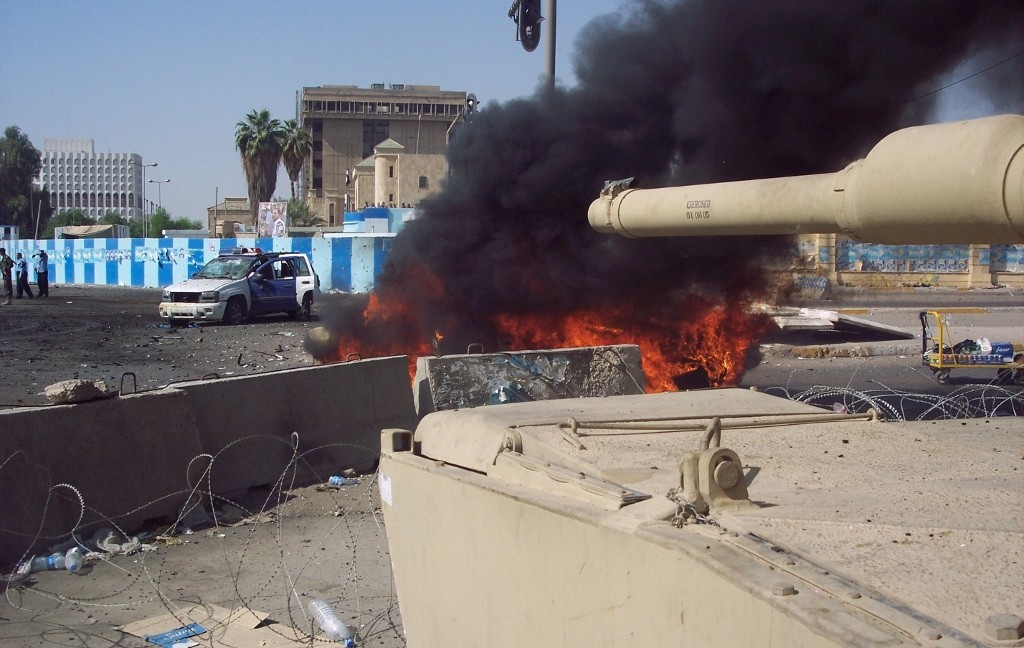Iraq’s Labors Lost

“Have you forgotten your labors so far?”
-Theseus to Heracles, Euripides’s Heracles
In Euripides’s telling of Heracles’s pre-divine adventures, the playwright breaks from the narrative recorded by Diodorus and Cicero by inverting the two major events in the Heracles myth. Euripides’ Heracles, instead of going about his labors as penance for murdering his wife and sons, murders his family after undertaking his labors. Heracles has been driven mad by the goddess Hera, who hates the mythical hero because her husband Zeus fathered him with a human woman. Hera negates the good works done by Heracles, the greatest hero of his day, because of anger and jealously stemming from a philandering spouse. In this way, Euripides makes a statement on the capriciousness of the gods who are as petty and debased as humans (and not an early commentary on PTSD, as some have absurdly suggested). His tale gives us a protagonist who saved man from its greatest threats and yet loses his hero status in a moment of deity-induced madness.
To ensure that Heracles’s labors are not forgotten because of his madness, Heracles’s friend Theseus, King of Athens, leads our erstwhile hero off to share of his lands and regain his former glory. Theseus bucks him up, reminds him of his greatness, and tows Heracles in his wake “like some little boat” to ensure Heracles’s place in the Pantheon of heroes. It is a touching moment of friendship as well as a reminder that acts of valor are fleeting if acts of weakness follow. As we used to say in the Army, you’re only as good as your last fight. And yet even a hero such as Heracles needs a friend to walk him through his times of weakness.
Iraq has been having its own Heraclean moment over the past few months: a fit of madness pervades the state in spite of the many labors taken to provide relative stability in the wake of the U.S. war. While not a work of petty divine intervention, the violence of recent months could potentially upend all of the work done since 2007. Beginning in December 2012 with the raid on the Sunni finance minister’s home and subsequent Sunni protests, violence has continually escalated, exacerbated by the Maliki government’s strong-handed tactics against protestors. This has spurred on Sunni insurgent and terrorist organizations who never accepted Shia dominance in Iraq to “fight back” against the injustices propagated by the state. The resulting cycle of violence is on a scale not seen since the very beginning of the Surge in early 2007.
Prime Minister Maliki finds himself in a hard place at the moment. Numerous divisive political issues have yet to be resolved, including federalism and the Kirkuk question, to name but two. Syria’s civil war has been a catalyst for renewed rearmament of Sunni groups, ostensibly to fight the Shia Alawites in Syria and to protect Sunni interests in Iraq. Most notably, Al Qaeda in Iraq (AQI, now ISIS, or the Islamic State of Iraq and Syria) has mobilized, as its members argue, to protect threatened Sunnis in both countries. Maliki cannot allow these armed groups to operate within Iraq (heaven knows he has his hands full with the Kurdish and Sadrist armed groups). And yet on his eastern border, Iran is openly flying military aid to Syria’s regime through Iraqi airspace. Maliki is similarly loath to let this happen, even if he is more willing to accept Iranian overflights than the resurgence of AQI as ISIS. But the question remains: can he do much about either problem?
Just this past week, ISIS mounted an impressive attack against prisons in Abu Ghraib and Taji that resulted in over 500 prisoners escaping, many of whom were allegedly mid- and senior-level AQI leaders. While many of the escapees have been caught since, ISIS has become a military force to be taken seriously. It has successfully conducted simultaneous complex attacks across Iraq, which indicates that ISIS has developed advanced capabilities not seen in the past 5 years. On the issue of Iran, Iraq’s Foreign Minister Hoshyar Zebari has claimed Iraq can do nothing about the overflights, and has called upon the international community to act instead. Either because of a lack of capability or a lack of political will to act against other Shia-dominated governments and stir domestic dissatisfaction, Maliki’s Iraq will not stop Iran from supplying Assad’s regime through Iraq’s territory.
Iraq has traveled a long and violent road and endured many labors in an attempt to build a modern state for its people. And yet madness and fury have returned, drawing the country back down that long and violent road. We now have a new question: if Maliki is unable or unwilling to stem the growing violence and infringements on Iraq’s sovereignty, is it up to the United States to do something to create the necessary capability or will to affect the situation?
Certainly the United States should not reintroduce general purpose forces into Iraq. That war is, by all accounts, done and dusted even if the political objects (impossibly framed as they were) were never achieved. Still, the United States could provide more policing and counterterrorism training, procure more advanced weapons for Iraq’s air defenses, and apply the political pressure necessary to get Maliki to act in a positive way that averts a civil war while meeting both Iraqi and U.S. objectives. In other words, while our war in Iraq is over, our political involvement is not. Disengagement is not in our or Iraq’s interests, even if the Obama administration would rather focus on other issues. Iraq needs its own Theseus to remind it of its hard-won labors and to guide it back onto the more peaceful path it had been on before the onset of its present madness. That is a role the United States could well play.
Jason Fritz is a Senior Editor at War on the Rocks.
Photo: U.S. Army

